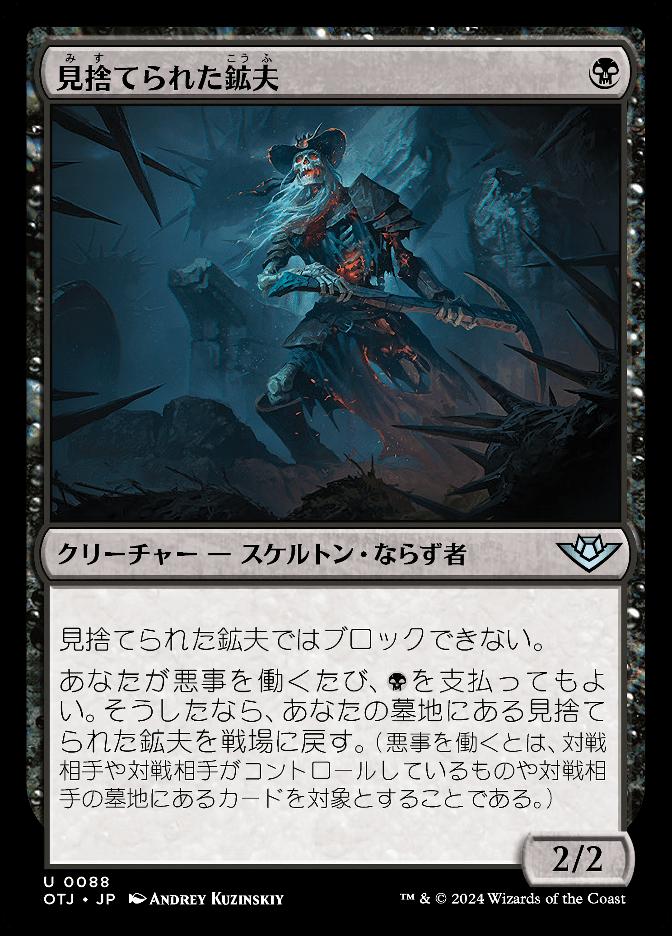セット名サンダー・ジャンクションの無法者レアリティアンコモンコレクター番号 88言語日本語

見捨てられた鉱夫
クリーチャーースケルトン・ならず者
見捨てられた鉱夫ではブロックできない。
あなたが悪事を働くたび、を支払ってもよい。そうしたなら、あなたの墓地にある見捨てられた鉱夫を戦場に戻す。(悪事を働くとは、対戦相手や対戦相手がコントロールしているものや対戦相手の墓地にあるカードを対象とすることである。)
あなたが悪事を働くたび、を支払ってもよい。そうしたなら、あなたの墓地にある見捨てられた鉱夫を戦場に戻す。(悪事を働くとは、対戦相手や対戦相手がコントロールしているものや対戦相手の墓地にあるカードを対象とすることである。)
2 / 2
フォーマット
スタンダード : 可能パイオニア : 可能モダン : 可能レガシー : 可能ヴィンテージ : 可能パウパー : 不可統率者戦 : 可能デジタル専用フォーマット
アルケミー : 不可ヒストリック : 可能タイムレス : 可能リミテッド評価値
集計期間
2024-04-16 ~ 2024-06-12
平均確認最終ピック数
4.53(13位31種中)
デッキ色 初期手札
勝率 手持ちゲーム
勝率 勝率上昇値
勝率 手持ちゲーム
勝率 勝率上昇値
ALL
58.1%18位
54.2%21位
1.8pp24位
57.0%23位
53.7%22位
0.8pp23位
59.5%6位
54.9%8位
1.5pp10位
53.7%26位
52.0%26位
2.5pp26位
63.4%6位
57.9%10位
2.1pp15位
data from 17Lands
同名カード
カード裁定
2024/04/12
原文Forsaken Miner’s last ability triggers only if Forsaken Miner is in your graveyard at the moment you cast a spell, activate an ability, or put a triggered ability on the stack with one or more targets that constitute a crime. For example, if you cast a sorcery spell that destroyed two target creatures and your targets were a creature controlled by an opponent and Forsaken Miner, Forsaken Miner’s ability won’t trigger. However, if you cast a spell with an additional cost of “Sacrifice a creature” and you sacrifice Forsaken Miner to pay that cost, Forsaken Miner’s ability will trigger as long as you committed a crime with that spell.
訳文見捨てられた鉱夫の最後の能力は、あなたが呪文を唱えるか、能力を起動するか、犯罪を構成する1つ以上の対象を持つ誘発型能力をスタックに置いた瞬間に、見捨てられた鉱夫があなたの墓地にある場合にのみ誘発します。たとえば、あなたが2体のクリーチャーを対象として破壊するソーサリー呪文を唱え、その対象が対戦相手がコントロールするクリーチャーで、見捨てられた鉱夫だった場合、見捨てられた鉱夫の能力は誘発しません。ただし、あなたが「クリーチャーを1体生け贄に捧げる」という追加コストを持つ呪文を唱え、そのコストを支払うために 見捨てられた鉱夫 を生け贄に捧げた場合、あなたがその呪文で罪を犯している限り 見捨てられた鉱夫 の能力は誘発する。
2024/04/12
原文You choose whether to pay as the triggered ability is resolving. Once the ability starts resolving, it’s too late for anyone to respond by removing Forsaken Miner from your graveyard to stop you from bringing it back.
訳文誘発型能力の解決時に、支払うかどうかを選択します。能力の解決が始まったら、誰かが対応してあなたの墓地から見捨てられた鉱夫を取り除いてそれを戻すのを止めるのは遅すぎます。
2024/04/12
原文A player commits a crime as they cast a spell, activate an ability, or put a triggered ability on the stack that targets at least one opponent, at least one permanent, spell, or ability an opponent controls, and/or at least one card in an opponent’s graveyard.
訳文プレイヤーは、少なくとも対戦相手1人、対戦相手がコントロールする少なくとも1つのパーマネント、呪文、能力、および/または対戦相手の墓地にある少なくとも1枚のカードを対象とする呪文を唱えたり、能力を起動したり、誘発型能力をスタックに置いたりすると、犯罪を犯します。
2024/04/12
原文The spell or ability that constituted a crime doesn’t have to have resolved yet or at all. As soon as you’re finished casting the spell, activating the ability, or putting the triggered ability on the stack, you’ve committed a crime.
訳文犯罪を構成する呪文や能力は、まだ解決されている必要はなく、解決されていなくてもかまいません。呪文を唱えたり、能力を起動したり、誘発型能力をスタックに置いたりし終わった時点で、犯罪を犯したことになります。
2024/04/12
原文For example, an ability that triggers when you cast a spell that targets an opponent will trigger at the same time as an ability that triggers whenever you commit a crime. Those abilities can be put on the stack in either order (if you control them both), and they’ll both resolve before the spell that caused them to trigger.
訳文たとえば、対戦相手を対象とする呪文を唱えたときに誘発する能力は、犯罪を犯すたびに誘発する能力と同時に誘発します。これらの能力は、どちらの順番でもスタックに置くことができます(両方をコントロールしている場合)。また、どちらも、それらを誘発させた呪文よりも先に解決されます。
2024/04/12
原文A player can commit only one crime per spell or ability they control. Targeting multiple opponents, permanents, spells, abilities, and/or cards with the same spell or ability doesn’t constitute committing multiple crimes.
訳文プレイヤーは自分がコントロールする呪文や能力ごとに 1 つの犯罪しか犯すことができません。同じ呪文や能力で複数の対戦相手、パーマネント、呪文、能力、および/またはカードを対象にしても、複数の犯罪を犯したことにはなりません。
2024/04/12
原文Changing the target or targets of a spell or ability won’t affect whether or not the controller of that spell or ability has committed a crime. Only the initial targets chosen for that spell or ability are used to determine whether or not its controller committed a crime.
訳文呪文や能力の対象を変更しても、その呪文や能力のコントローラーが犯罪を犯したかどうかには影響しません。その呪文や能力に最初に選択された対象のみが、コントローラーが犯罪を犯したかどうかの判断に使用されます。
data from gatherer